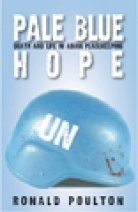Pale Blue Hope: Death and Life in Asian Peacekeeping
Opening with the words “A prostitute with her legs spread wide” is an effective attention grab if nothing else.
It could also be a metaphor about being stuck in something deep, likely a familiar position for a United Nations human rights lawyer in the Middle East.
In Pale Blue Hope, Toronto-based Ronald Poulton candidly and shamelessly describes his experiences in both Tajikistan and Cambodia, investigating political murders and peace negotiations amidst UN bureaucracy.
This scrap-the-shit commentary is structured by the events surrounding the murder of Team Garm, a UN observer force consisting of four UN officials.
Though the foreign content is daunting, Poulton’s vivid and personal details make even totalitarian regimes and extremist Islamic opposition surprisingly understandable.
At the very least, the mere premise of the book is fascinating. Beneath vague and confusing peace negotiations is a Canadian UN lawyer bluffing about UN jurisdiction and its ability to infiltrate Cambodian prisons.
Poulton also witnesses a civilian grenade attack, describing what it feels like to still be transporting wounded bodies two hours later, with the honesty to admit enjoying the strange sensation of hands sticky with congealed blood.
Not entirely death, gore and principles, Poulton writes from a somewhat detached perspective. With an ideal of having no one to answer to, enough money to live on and the ability to move, change jobs and remake himself countless times, Poulton’s remarks are a sharp contrast to those you might hear from “poorly paid, highly motivated zealots.”
Considering most UN human rights morale comes from rejection of status quo, statements can easily become ironic, such as those from moralist Richard Rorty, that “unlike us, those people are used to being raped and castrated.” Though Rorty’s sarcasm is poignant, such comments from Poulton are rarely found in the book.
Occasional simplistic generalizations like “Americans will do anything, anything at all, if they hate your guts” and “to punish the Vietnamese, the U.S. policy on Cambodia allowed the Khmer Rouge to flourish” are bold stances that hint of bias.
However, more warranted critiques of the UN – like “criticized for inactivity and complacency in human rights enforcement, when we finally took a step, we stepped in shit” – are supported by failure to sanction arrests, among other scandals.
Although at times heavy and sullen, Poulton’s ingenuity and spontaneity lighten an otherwise grim reality.
Considering I barely even knew Tajikistan existed before reading this book, or that peace negotiations were being attempted in such a volatile political climate, Pale Blue Hope makes for an incredibly interesting read.
Published in Volume 64, Number 6 of The Uniter (October 8, 2009)








